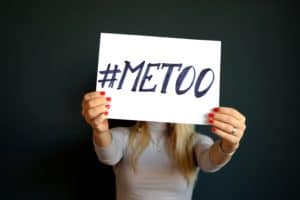Sexual Harassment in the Fundraising Donor Space – Part One
 We have talked a lot about workplace sexual harassment on this blog. Practising exclusively in workplace law we, unfortunately, see the issue of workplace sexual harassment come up a lot. Helping employers and employees of all shapes and sizes deal with issues related to sexual harassment makes up a lot of what we do.
We have talked a lot about workplace sexual harassment on this blog. Practising exclusively in workplace law we, unfortunately, see the issue of workplace sexual harassment come up a lot. Helping employers and employees of all shapes and sizes deal with issues related to sexual harassment makes up a lot of what we do.
Employer Obligations
Ontario organizations and businesses, be they big or small, for-profit or non-profit, as long as they have at least one worker of some type, paid or unpaid, have obligations regarding workplace harassment, violence and sexual harassment under the Ontario Occupational Health and Safety Act (OHSA), as well as the Ontario Human Rights Code. Other provinces have similar legislation and employer obligations. Employers must take steps to protect workers from violence, harassment and sexual harassment on the job and in the workplace.
Workplace, by the way, does not just mean the physical office or worksite but any land, premises, location or thing at, upon, in or near which a worker works. If a worker goes on a work trip, attends an event as part of their job, or travels to a client site then those places are also the workplace and the employer’s obligation to keep the worker safe travels with them.
Safe From Whom?
Given the expansive definition of the workplace, readers will likely not be surprised to learn that employers – who must take every precaution reasonable in the circumstances to protect the worker – must guard against violence and harassment that may come from outside of the workplace. Workplace harassment does not just mean harassment that may occur between employees or co-workers. Harassment may also come from donors, clients, outside vendors, board members, volunteers or investors.
When the Harasser is Important to Business
The unfortunate reality in many workplaces is that the harasser is powerful and needed. This is why, presumably, all those people in the know at CBC kept quiet about Jian Gomeshi for so long. His ratings were good and he was an important part of the show. That he has been replaced by the great Tom Power and that Q is still going strong is perhaps a lesson in how even the seemingly irreplaceable are replaceable.
In 2017 and 2018, we saw many news stories about sexual harassment in Silicon Valley and the venture capital world. Many stories came from women entrepreneurs seeking funding from powerful and wealthy venture capitals. Seed funding, in many cases, seemed to come with the condition of grinning and bearing sexual harassment or worse.
Of course we all know about the #metoo movement over the last couple of years in which the arts industry found a very public online voice that brought down some of the most powerful aggressors in Hollywood and beyond.
This begs the question of what to do when needed money, support, power or influence comes with the condition of tolerating harassment? Or, how to handle the situation if your most important client keeps hitting on your receptionist? Or the job is conditional on agreeing to sexual conduct? An employer may want to keep a top performer, an important client or take the money of a smarmy investor or donor but can they? Or equally as important, should they? What are an employer’s obligations in these cases? We will explore these questions in our next post.
In the meantime, if you are dealing with harassment in your work get in touch or read our past posts on harassment and sexual harassment for more on this issue.






